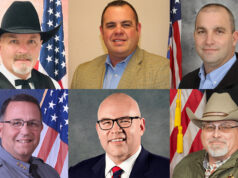

Going into this year’s legislative session, state agencies received notice they may face budget cuts that could result in reductions-in-force, furloughs or reduced services. As the smoke cleared after the hustle and bustle that took place during the last week of session, three of those agencies ended up with another scenario — no state appropriations at all.
The State Bond Advisor’s Office, the Horse Racing Commission and the State Fire Marshal’s Office were “zeroed out” in this year’s state budget. Each of those agencies, however, will continue operating under different circumstances, including one that is less than enthusiastic about the change.
State Bond Advisor’s office
The Oklahoma State Treasurer’s office will pick up new duties this year, including operational oversight of the State Bond Advisor’s office. The State Bond Advisor primarily provides advice and assistance to the governor and Legislature on matters related to capital planning, debt issuance and debt management. The bond advisor staff also serves in an advisory role to the Council on Bond Oversight, which reviews and must approve any request for financing for all state government entities.
State Bond Advisor James Joseph said he didn’t see any reason for his office to be placed in the Treasurer’s Office. He said the agency wouldn’t gain any advantages by being a part of this transition.
“There’s really no reason at all,” Joseph said. “There’s no functional benefit. There’s no savings.”
The agency received a state appropriation of $110,687 last year, but the total operating budget for the agency is nearly four times that amount. The additional money is generated through fees issued on each state bond issue.
Tim Allen, deputy treasurer for communications and program administration, said the change wasn’t a request from the Treasurer’s office, but it would allow for the state treasurer to have a role in debt management. State Treasurer Ken Miller said this would help align Oklahoma with what is already in place throughout the majority of states.
“Proponents know the vast majority of state treasurers have significant responsibility for debt management and pension investment,” Miller said. “The Oklahoma treasurer is independently elected, directly accountable to the people and constitutionally charged with safeguarding public funds. Yet the position has no active role in debt management or pension investment.”
In addition to the treasurer’s office taking a more active role in the bond oversight process, the Miller will now have a seat on the boards of the Oklahoma Teachers Retirement System and the Oklahoma Public Employees Retirement System.
Allen said no decisions have been made yet in terms of whether or not the Bond Advisor’s office would physically be moved to the offices of the State Treasurer. With the transition taking place Nov. 1, he said the agency had some time to consider options in moving forward.
“Once the measure takes effect, we will conduct a comprehensive review of current policies and procedures,” Allen said. “As is always the case, we should always look for ways to improve government functions.”

Among the proponents for reducing money appropriated by the Legislature is the Oklahoma Council on Public Affairs. Trent England, executive vice president for OCPA, said the organization was supportive of this type of move but admitted he didn’t see it making much of a difference overall.
“I don’t think this change is really moving the needle one way or the other,” England said.
Joseph, however, disagreed with the potential of the transition. With the state treasurer being a politically elected position, he said it opened the door for taking away the independence of the office.
“I was strongly opposed to the idea,” Joseph said. “It politicizes an office that was previously independent.”
Putting out fires
On the other hand, State Fire Marshal Robert Doke is all smiles with his office’s move to becoming a non-appropriated agency. The agency received $1.43 million in state appropriations from the general revenue fund last year but will receive future monies directly from industry fees.
House Appropriations Chair Leslie Osborn (R-Mustang) said this was a relatively simple move given that the agency was already receiving the money via a state appropriation.
“It was a wash in that it was dollars that were used to fund them anyway,” Osborn said.
The State Fire Marshal’s Office will receive additional money through a revolving fund to pay for the duty of overseeing the Firefighter Training Advisory Committee, which was formerly the Council on Firefighter Training. Agents working for the State Fire Marshal’s Office will now handle the training.
Doke said the agency will take revenue from the capital-outlay part of the budget, which usually represents 15 to 20 percent of the budget. He said this could affect upgrades to vehicles or equipment in years when the revenues are down, but said he still believed it would be a good move.
“We realize that and know that is a risk we will have to take,” Doke said. “It’s a part of the plan to get the state back on solid footing.”
No horsing around
While officials are in disagreement on what might happen with the State Bond Advisor, those involved with the horse racing industry all seem on board with the decision to make the Oklahoma Horse Racing Commission a non-appropriated agency.
Debbie Schauf, executive director of the Oklahoma Quarter Horse Racing Association, said industry officials had reviewed the dwindling state appropriations in recent years. They determined that the horse racing-oversight agency would be better served by being funded directly through the private industry.
“We have a pretty good feel for what it takes to regulate this industry,” Schauf said. “To me, this is one of the best examples of good public policy I have seen in a long time.”
Traditionally, income generated from horsemen and racetrack license fees, pari-mutuel taxes, fines and a percentage of electronic gaming revenue was placed in the general revenue fund, and the OHRC appropriation was determined annually based on legislative decisions. That revenue will now go directly to the OHRC, which agency director Kelly Cathey said will allow the agency to bypass the Legislature in receiving operational revenue.
“It requires racing industry participants (racetracks and horsemen) to be responsible for additional regulatory funding,” Cathey said. “The merits of this measure were obviously clear to elected officials as it received overwhelming support from both legislative bodies, as well as racing industry participants themselves (Thoroughbred Racing Association of Oklahoma, Oklahoma Quarter Horse Racing Association, Remington Park, Will Rogers Downs and Fair Meadows Tulsa).”
Political analyst Scott Mitchell said he saw this as a positive move for the horse racing industry that would serve as a great example for other industries.
“I think it’ll pay dividends down the road,” Mitchell said. “This is an example of where taxpayers get relief because some innovative people in the market decided to step up.”
The agency requested $3.3 million this year, but additional revenues could be made available to OHRC due to a change in the state law that allows horse racing tracks to maintain the same operational hours as tribal casinos.
Looking ahead
Osborn said the Legislature has already made significant changes to the funding structure of numerous agencies in recent years, but said there may only be a handful remaining that could be considered in the future.
“We’ve done that with about as many agencies as we can,” Osborn said. “If it doesn’t make sense, I don’t think there’s really a reason to do that (with additional agencies).”
Among those is the Oklahoma Space Industry Development Authority, which has operated a spaceport in Burns Flat since 2006. Osborn said there could be some partnerships that could be considered, including with Vance and Altus Air Force bases.
According to Mitchell, several state agencies are in need of changes, whether it is how they are funded or how they use the money they receive. He said there are agencies that seem to just tread water rather than make improvements in how the agency operates. He said changes need to be made at the top of the leadership chain for those agencies.
“Only in government do you put a team on the field that loses year after year and keeps the same head coach,” Mitchell said.
England said the Legislature has been moving in a positive direction when it comes to eliminating deficiencies in government and eroding some of the waste. He admitted that some barriers exist that make it difficult to completely overhaul some of the issues, but said more could be done.
“It’s so hard for the Legislature to put full stop on something the government does,” England said. “It would really be great to see the Legislature to put an end to some things that are low-priority.”




















